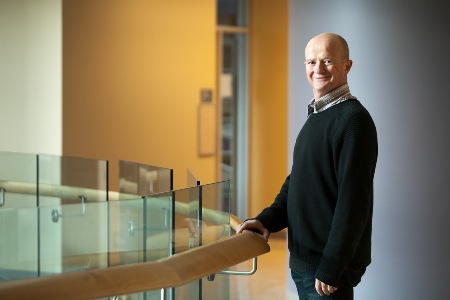Chemistry/physics professor thrives on surfing the boundaries of knowledge
November 25, 2013
Share
By Wanda Praamsma, Communications Officer
Jean-Michel Nunzi is always looking to surf the boundaries of knowledge. Being able to move along the edge of the unknown, while not without challenges, is where the excitement of research lies, he says. It’s also the beauty of working in an academic environment, which allows the freedom to explore without the constraints of quick deadlines.
And Dr. Nunzi – who was recently renewed as a Tier I Canada Research Chair (CRC) in Photonics for Life, with funding of $1.4 million – is not looking for quick solutions to the big problems he’s curious about. His three major projects span five-, 10- and 15-20-year timelines.
 Jean-Michel Nunzi, cross-appointed in chemistry and physics, was recently renewed as a Tier I Canada Research Chair in Photonics for Life, with funding of $1.4 million.
Jean-Michel Nunzi, cross-appointed in chemistry and physics, was recently renewed as a Tier I Canada Research Chair in Photonics for Life, with funding of $1.4 million.“All research requires a lot of time. If we want to change things, we need to dedicate a lot of time, a lot of work,” he says. “Many things, from GPS units to cell phones and computers – we are never told how much time went into creating these things, to making these tools. It takes many years, and many people working together.”
Dr. Nunzi, who is cross-appointed in chemistry and physics, is indeed setting out to change things, using his research into the interaction of light with matter to improve medical testing devices; to address energy needs by creating low-cost technology for highly efficient large-area solar cells; and to develop models of artificial intelligence, essentially harvesting the divergent parts of science to create models that can be easily computed and applied to global problems, such as illness and disease.
“My research is driven by what I think humankind wants and needs now – we need to provide medicine to a large number of people without increasing the price, we need energy, and we need artificial intelligence to be able to harvest parts of knowledge that are outside the usual boundaries.”
It sounds overwhelming, to be working on the foundations of solutions for large world problems with very long-term goals. But Dr. Nunzi doesn’t see it that way. He says scientists look at time differently and he takes on the immensity of the projects with a focus on the present, on the day-to-day. He’s grateful for the CRC position, which allows him to plan into the future in the way he does, and for his students in both physics and chemistry who carry out much of the day-to-day work.
“It’s great to be able to provide students with challenging work on high-level projects,” he says. “You see a real change in the students over the years they work here – it’s transformative for them.”
More on the Nunzi Research Group and the 2013 Canada Research Chair announcement